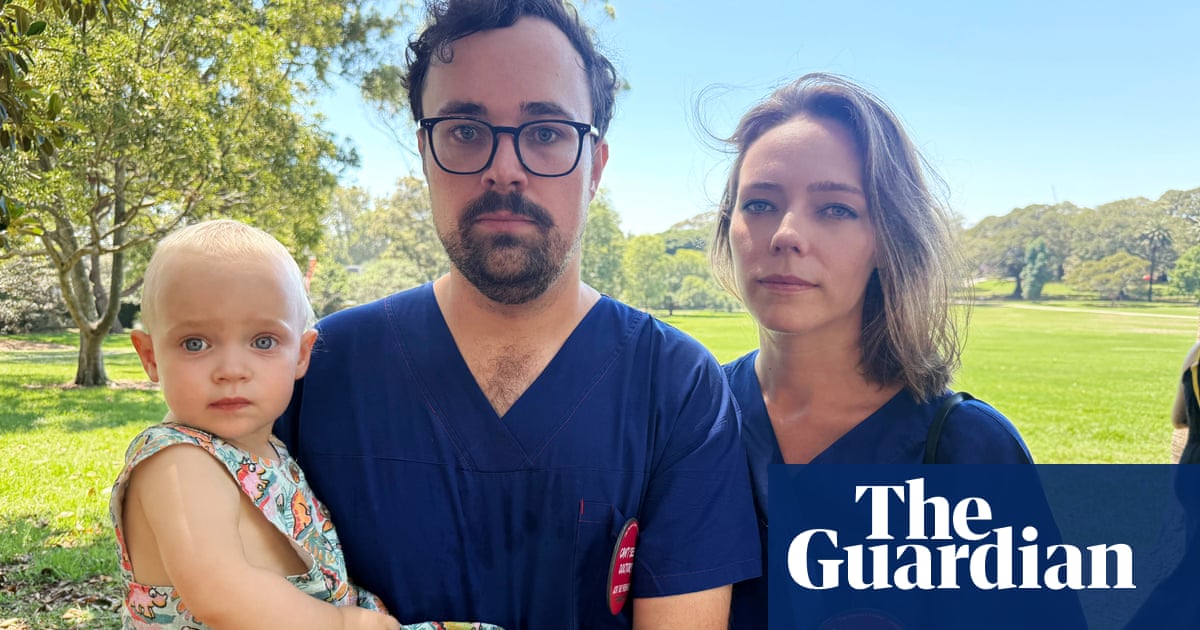When Dr James Leeder goes to work as a psychiatry registrar in North Sydney he sees some of the most challenging patients in medicine – sometimes in a single night – “horrific acts of self harm, hopelessness, people in the throes of psychosis, those who may be deeply substance affected and may be agitated and aggressive”.
“This is a hard job done by people who want to help,” he says. However, he sees the toll it is taking on his colleagues when – amid a workforce crisis where one in three psychiatrist positions in the state are vacant – they provide care for double the number of patients they are meant to.
“When you are not physically able to provide the care that you know from your training and from the evidence is best for those patients – that hurts. That’s what moral injury is. The system is forcing us to compromise in ways that we do not want to,” Leeder says.
“I have watched [others] suffer from this burden, and I do not want to suffer it myself.”
As a trainee, he is not one of the more than 200 psychiatrists in the NSW public system threatening to resign next week, but he attended a press conference this week held by the doctor’s union – the Australian Salaried Medical Officers’ Federation (Asmof) – in support of the action. This is “not just a staff specialist pay dispute, this is about saving the future of the mental health service in New South Wales,” he says.
The specialist doctors intend to resign after more than 16 months of negotiations about the workforce crisis. The government has not accepted their proposed solution – a special levy increasing their pay by 25%, similar to that which emergency doctors received in 2015, which would help bring NSW salaries to parity with other states and territories.
A survey of 273 psychiatrists undertaken by the NSW branch of the peak body for psychiatrists, the Royal Australian and New Zealand College of Psychiatrists (RANZCP), found 71% of psychiatrists are likely to leave the public sector in the next 12 months if no changes are made to pay or conditions. Of that number, 81% are early career psychiatrists aged between 30 and 40.
An anonymous psychiatrist resigning from the public system on Tuesday told Guardian Australia the resignations are not about their own pay: “We believe there will be a collapse of the public mental health system if we don’t act.”
Dr Tanya Ahmed, a psychiatrist who has worked in public and private hospitals, says those psychiatrists resigning from the public system are the least focused on money – “that’s the irony of the situation”. But they argue higher salaries are needed to attract new doctors to the field and to retain those currently working in the public system.
Ahmed says with a shortage of psychiatrists across the state, including the private sector, all the psychiatrists working in the public sector could easily take higher paying jobs in the extremely competitive market.
“They’re the ones that have been prepared to stick it out when they could be earning thousands of dollars a day [elsewhere] … that have resisted those moves that so many others have made to having an easier life with less responsibility, less acute unwell patients and a lot more money.”
In December, amid the negotiations with psychiatrists, the government’s response was to propose a six-month “productivity and efficiency pilot project” which would have been undertaken without additional pay, that would be “conducted with a view … to enable additional salary increases” where savings were found “through the productivity and efficiency measures”.
Dr Rafe Pulley, a psychiatrist who is resigning from his position as a staff specialist in NSW next week, says for psychiatrists to be asked to participate in the efficiency trial in return for the possibility of a future pay increase was “the straw that broke the camel’s back. There is just no more fat to be cut from the system”.
Dr Alexei Narushevich, an emergency physician at Nepean hospital, told this week’s Asmof press conference that the strategies the government ministry had devised to mitigate the loss of those psychiatrists are the same strategies that haven’t worked in western Sydney for the past 10 years, with care falling to emergency department doctors.
It means, at Westmead hospital, junior doctors are working in the emergency department, assigned to look after patients suffering from serious mental health crises who have been waiting in the department for days, despite such care being beyond the scope of their training.
“If they’re lucky, [these patients] will get a bed. If they’re unlucky, they’ll be in a recliner chair waiting for proper psychiatric assessment for multiple days,” a junior doctor told Guardian Australia.
The junior doctors know the emergency department – loud, bright and an impossible place to sleep in – is “not a good place to be if you’re having a mental health crisis”. And the doctors are affected by what their patients are experiencing.
“It’s exhausting. I feel like I go home from work feeling worse … feeling like we’ve not done what we know is needed to properly help the mentally ill in this state,” the junior doctor says.
After no further agreement was reached by the NSW government and representatives of Asmof and RANZCP on Thursday, a spokesperson for the government said it has invited both parties to continue discussions on Monday, before the resignations take effect the following day.
“The government reiterated it’s position that it is not possible to negotiate with former employees; it is vital that psychiatrists not resign and stay at the table to work with the government on a path forward,” the spokesperson said.
Narushevich says doctors are frustrated that the government is telling them to think about their patients’ welfare. “We have been thinking of patients. We’ve been thinking [about them] the whole time, and we’re worried about what’s going to happen. We’re on the brink of a collapse here.”
Article by:Source – Natasha May














